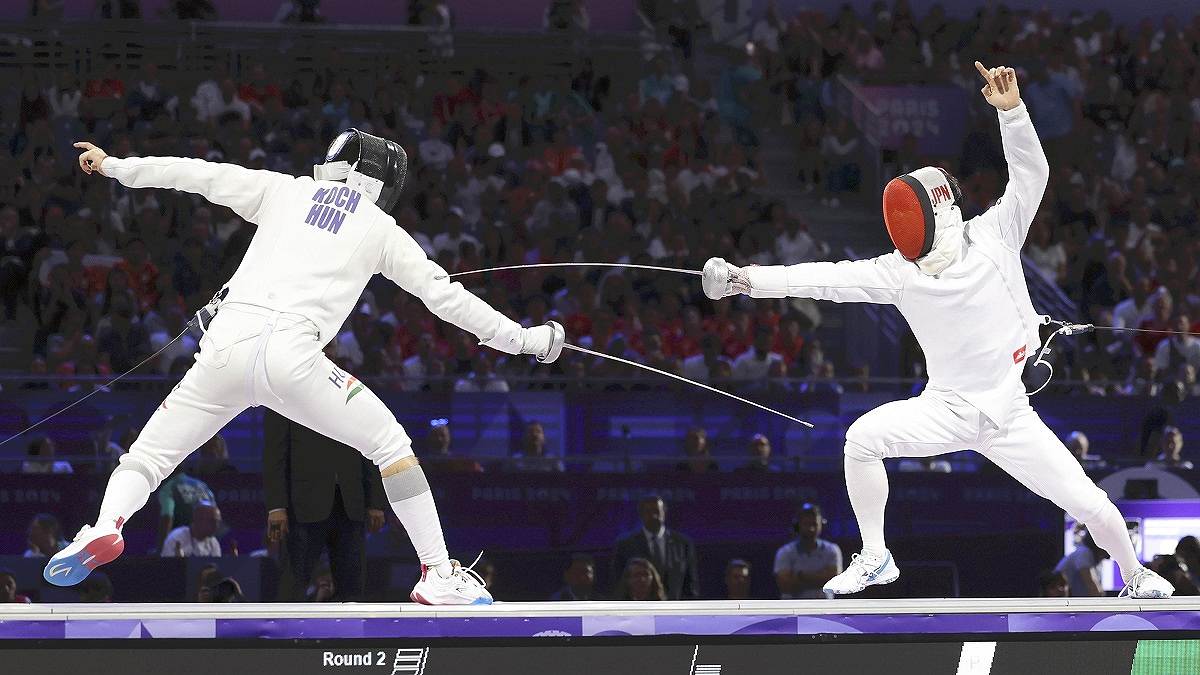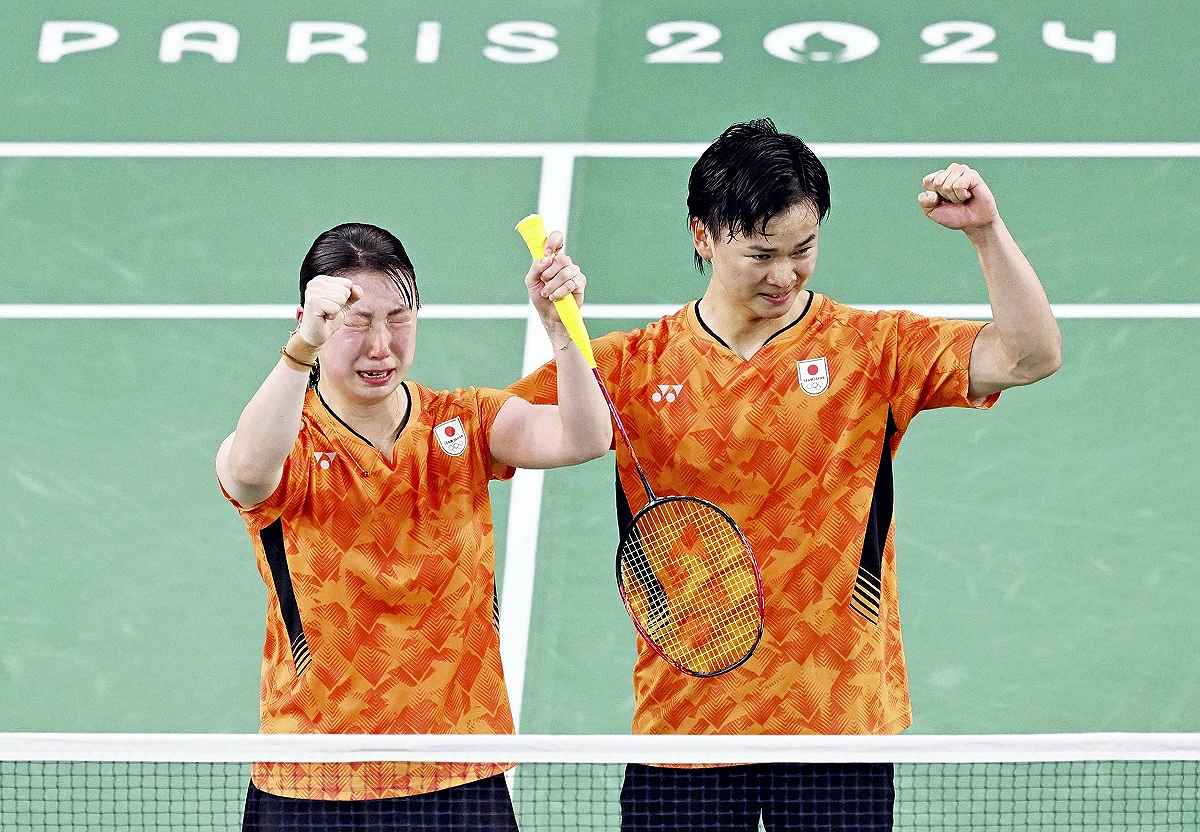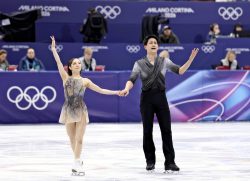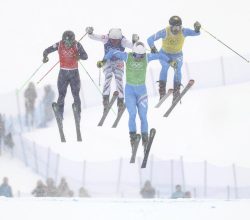Hungary Just Barely Keeps Japan From Fencing Gold; Badminton Medalists Say Communication Key to Success

Koki Kano, right, battles his Hungarian opponent in the fencing men’s epee team final in Paris on Friday.
18:32 JST, August 3, 2024
PARIS — Japan’s silver medal in men’s epee team fencing came with “regret.”
In the final match, the Japanese team drove the team from Hungary, one of the world’s strongest countries in the sport, into a corner. The Japanese team came within a hairbreadth of gold, but victory was not to be theirs in the end.
In the ninth relay of the match, when the Hungarian team had a 2-point advantage, Koki Kano, who won a gold medal in the men’s epee individual category, fought as the final fencer.
Kano fought with Gergely Siklosi, who is ranked second in the world as an individual epee fencer. Kano wrested 2 points from the strong opponent with 6 seconds remaining in the relay. This moved the Japanese team into a tie with Hungary.
The match then entered sudden-death overtime, in which the first combatant to score a point secures victory for their team. The two aces fought with their pride on the line.
Kano bravely attacked and the two almost simultaneously hit each other’s chest. But the tip of Siklosi’s sword reached Kano’s chest quicker.
After losing by a paper-thin margin, Kano said, “As I aimed for the gold medal, I feel regret.”
Despite the loss, this time was an opportunity in which members of Japan’s men’s epee team racked up many achievements.
At the Tokyo Olympics, in which the Japanese team won a gold medal, they participated in the event on a host-country ticket. In the Paris Games, for the first time, the Japanese team earned their ticket to compete on the strength of their own match results.
Further proof of the team’s improved skills is that it won with slight margins from the first match, against Venezuela, to the semifinal, against the Czech Republic.
In the Paris Games fencing events, Japan has already won a total of three medals across men’s epee individual, men’s epee team and women’s foil team.
Japan has surpassed its goal of winning at least two medals in fencing, and it is possible that the number will further increase.
Kazuyasu Minobe of the Japanese fencing team emphatically said that Japanese fencers “are in a position in which they can aim for medals in all fencing categories. It was a result of training for enhancement toward the Tokyo Olympics, and so we must not rest on our laurels.”
Communication key to medal
Deepening communication led badminton pair Yuta Watanabe and Arisa Higashino to win medals in two consecutive Olympics.
Watanabe, 27, and Higashino, 28, have been a badminton mixed doubles pair for 13 years. By complementing each other’s strengths and weaknesses, the pair was able to win the bronze medal.
After the pair won the first game, their second game stayed persistently even. Higashino told the hot-blooded Watanabe: “It’s all right. You don’t need to hustle.” Her words helped Watanabe calm down.

Yuta Watanabe, right, and Arisa Higashino express delight after winning a bronze medal in badminton mixed doubles in Paris on Friday.
In the final phase of the second game, the pair forced the opposing side into a mistake. The duo collapsed onto the floor in an explosive expression of delight.
They have valued on-court dialogues since they set a goal of winning a gold medal in the Paris Olympics. From practice onward, they frequently exchange opinions about such things as directions of shots.
Also during matches, they consider strategies by telling each other points they noticed, such as that moves of opponent players often stop in a certain way.
They even reached the point at which, Watanabe said, “We became able to reveal negative factors to each other.”
Because they honestly tell each other such things as “My legs are hard to move today,” and “I can’t make this kind of play,” the pair has searched for ways to win even when their condition is suboptimal.
Top Articles in Sports
-

Milano Cortina 2026: Figure Skaters Riku Miura, Ryuichi Kihara Pair Win Gold; Dramatic Comeback from 5th Place in SP
-

Milano Cortina 2026: Kokomo Murase Comes Out on Top After Overcoming Obstacles, Aiming for Greater Heights in Competition
-

Milano Cortina 2026: Riku Miura, Ryuichi Kihara Clinch Japan’s 1st Gold in Pairs Figure Skating, Rebounding from Disappointing Short Program
-

Milano Cortina 2026: Olympics-Torch Arrives in Co-Host Cortina on Anniversary of 1956 Games
-

Milano Cortina 2026: Japan’s Athletes Arrive in Italy for Milano Cortina Winter Olympics; Other Athletes to Arrive from Now
JN ACCESS RANKING
-

Japan PM Takaichi’s Cabinet Resigns en Masse
-

Japan Institute to Use Domestic Commercial Optical Lattice Clock to Set Japan Standard Time
-

Israeli Ambassador to Japan Speaks about Japan’s Role in the Reconstruction of Gaza
-

Man Infected with Measles Reportedly Dined at Restaurant in Tokyo Station
-

Videos Plagiarized, Reposted with False Subtitles Claiming ‘Ryukyu Belongs to China’; Anti-China False Information Also Posted in Japan





















